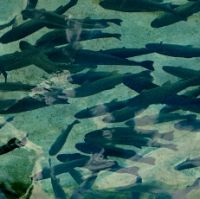

In order to protect salmon from the worst effects of climate heating, millions of trees are being planted beside Scotland's most remote rivers.
Fisheries scientists have found that rivers and burns in the Highlands and Uplands are already too warm in the summer for the wild Atlantic salmon as they head upstream to spawn, increasing the threat to the species' survival.
Fisheries on the River Dee in Aberdeenshire have planted 250,000 saplings alongside the key tributaries. By 2035, they plan to plant a million in the Dee's catchment, including species of native rowan, aspen, Scots pine, birch, willow, hawthorn and juniper.
In 2018, the year that Scotland recorded the lowest rod catch for salmon since the records began, climactic changes meant that the water temperatures in 70% of salmon rivers were too warm for at least one day during the summer, exceeding 23C, a temperature that induces stress and behavioural change. As a coldwater species, the Atlantic salmon prefer summer temperatures above 10C, but at 33C they are unable to survive.
Though stretching for 64,000 miles Marine Scotland scientists have found that only 35% of Scotland's rivers have adequate tree cover. The River Director for the Dee District Salmon Fishery Board, Lorraine Hawkins, said: "These rivers and burns are the nursery grounds for young fish and it’s the young fish which will be affected by summer temperatures – their feeding and growth rates are affected. If it gets hotter, we will see fish dying".
Fishery boards across Scotland have implemented similar tree-planting programmes, to provide the essential shade that will lower water temperatures. Many will be fenced off to prevent the saplings being eaten by deer. Hawkins has said that these projects improved the overall health and biodiversity of rivers across the uplands, increasing the insect life, leaf fall, managing essential nutrients and flood control.
The Director of Fisheries Management Scotland, Alan Wells, said that if climate forecasts were clear, water temperatures would continue to climb, even if the governments succeeded in limiting climate heating to close to 1.5C.
"We’ve seen situations where the temperatures in our rivers are approaching critical levels for our salmon, temperatures that they can’t tolerate. This will get worse. We need to grow trees now to create that cooling shade".
The dramatic decline in numbers of wild salmon is blamed on a variety of factors:
Wells said that while Scottish Ministers were proposing new conservation strategies, he still remained frustrated with the slow pace of change.